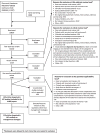Management of Renal Masses and Localized Renal Cancer: Systematic Review and Meta-Analysis
- PMID: 27157369
- PMCID: PMC5593254
- DOI: 10.1016/j.juro.2016.04.081
Management of Renal Masses and Localized Renal Cancer: Systematic Review and Meta-Analysis
Abstract
Purpose: Several options exist for management of clinically localized renal masses suspicious for cancer, including active surveillance, thermal ablation and radical or partial nephrectomy. We summarize evidence on effectiveness and comparative effectiveness of these treatment approaches for patients with a renal mass suspicious for localized renal cell carcinoma.
Materials and methods: We searched MEDLINE®, Embase® and the Cochrane Central Register of Controlled Trials from January 1, 1997 through May 1, 2015. Paired investigators independently screened articles to identify controlled studies of management options or cohort studies of active surveillance, abstracted data sequentially and assessed risk of bias independently. Strength of evidence was graded by comparisons.
Results: The search identified 107 studies (majority T1, no active surveillance or thermal ablation stratified outcomes of T2 tumors). Cancer specific survival was excellent among all management strategies (median 5-year survival 95%). Local recurrence-free survival was inferior for thermal ablation with 1 treatment but reached equivalence to other modalities after multiple treatments. Overall survival rates were similar among management strategies and varied with age and comorbidity. End-stage renal disease rates were low for all strategies (0.4% to 2.8%). Radical nephrectomy was associated with the largest decrease in estimated glomerular filtration rate and highest incidence of chronic kidney disease. Thermal ablation offered the most favorable perioperative outcomes. Partial nephrectomy showed the highest rates of urological complications but overall rates of minor/major complications were similar among interventions. Strength of evidence was moderate, low and insufficient for 11, 22 and 30 domains, respectively.
Conclusions: Comparative studies demonstrated similar cancer specific survival across management strategies, with some differences in renal functional outcomes, perioperative outcomes and postoperative harms that should be considered when choosing a management strategy.
Keywords: carcinoma, renal cell; comparative effectiveness research; disease management; kidney neoplasms; surgical procedures, operative.
Copyright © 2016 American Urological Association Education and Research, Inc. Published by Elsevier Inc. All rights reserved.
Figures


Comment in
-
Editorial Comment.J Urol. 2016 Oct;196(4):999. doi: 10.1016/j.juro.2016.04.103. Epub 2016 Jun 28. J Urol. 2016. PMID: 27368141 No abstract available.
-
Editorial Comment.J Urol. 2016 Oct;196(4):998. doi: 10.1016/j.juro.2016.04.102. Epub 2016 Jun 28. J Urol. 2016. PMID: 27368142 No abstract available.
References
-
- Kutikov A, Fossett LK, Ramchandani P, et al. Incidence of benign pathologic findings at partial nephrectomy for solitary renal mass presumed to be renal cell carcinoma on preoperative imaging. Urology. 2006;68:737. - PubMed
-
- Lane BR, Babineau D, Kattan MW, et al. A preoperative prognostic nomogram for solid enhancing renal tumors 7 cm or less amenable to partial nephrectomy. J Urol. 2007;178:429. - PubMed
-
- American Cancer Society. Cancer Facts & Figures 2014. Atlanta: American Cancer Society 2014; Available at http://www.cancer.org/research/cancerfactsstatistics/cancerfactsfigures2.... Accessed September 24, 2014.
-
- Campbell SC, Novick AC, Belldegrun A, et al. Guideline for management of the clinical T1 renal mass. J Urol. 2009;182:1271. - PubMed
Publication types
MeSH terms
Grants and funding
LinkOut - more resources
Full Text Sources
Other Literature Sources
Medical

